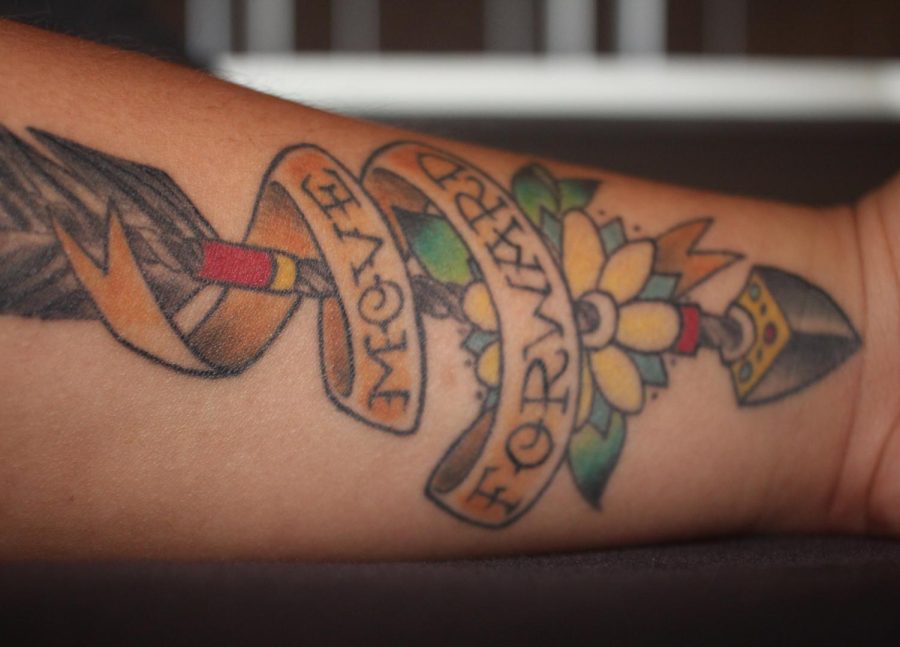The elephants on our chests
Junior journalism major Adrian Leuthauser bares his arm tattoo on Sunday, Nov. 13, 2016, that he got as a way to cope with thoughts of self-harm.
November 13, 2016
Michelle Eatman is taking a test and she is starting to feel nervous. This is routine.
Soon Eatman, a junior international relations major, will become breathless, violently sucking in whips of air as her mind blanks, stalls and eventually crumbles under panic before her pencil even hits the paper.
“These feelings are like a monster sitting on your chest,” Eatman said, “or more like, an elephant is always just sitting on your chest. It’s always hard to breathe. Your heart starts beating out of your body, so much so that you can almost see it.”
These are similar feelings junior political science major Matthew Chernesky experiences with his depression, a yearly on-and-off struggle that once led him to stare at a bottle of opened pills with temptation to ingest them all. Same with Adrian Leuthauser, a junior journalism major, who admits that he finds his mind wandering to death during long drives in the car.
“Depression has frayed my relationships with my family and those around me,” Chernesky said. “I constantly feel like a burden to those around me, so I hesitate to share information about my life and what I’m experiencing.”
These three students represent a small fragment of the growing anxiety and depression concerns on college campuses nationwide.
A 2015 annual report released earlier this year by the Center for Collegiate Mental Health at Penn State University unearthed an even more troubling reality: nationwide college students more than ever before are seeking mental health treatment on campus, at a rate outpacing the growth of enrollment.
Kent State is no exception. With three psychological services offered on-campus, staff members are juggling with waitlists and working long hours in order to get help to everyone in need.
Chief psychologist Pamela Farer-Singleton’s office at the DeWeese Health Center resembles a sprawling tropical oasis, with lush greenery and classical African artwork lining nearly every part of the room. Two plush couches are centered in the middle. There is even a sink, with a bottle of mouthwash and a few other toiletries to its side.
Farer-Singleton gave a soft smile when complimented about the coziness of her office.
“Well, it kind of has to be,” she said. “I basically live here.”
There is no exaggeration present in her voice. Farer-Singleton, along with other psychologists employed by Kent State’s University Health Services, are trying to keep up with student’s growing demand for help on campus.
All three psychological offices at Kent State combined had served 1,654 students in the fiscal year of 2015-2016, according to public records. The number doesn’t include everyone who pursued services, however, and instead reflects students who received services.
According to Farer-Singleton, the DeWeese Health Center’s waitlist for psychological services began as early as mid-September. Similarly, the Psychological Clinic at Kent Hall has been running wait lists throughout the whole year.
The Counseling and Human Development Center in White Hall stopped accepting new patients for this semester altogether after reaching maximum capacity several weeks ago.
While psychological services prides itself on its ability to help every patient on a waitlist, the time between requesting help and actually getting help is always uncertain.
“Some students receive a psychologist weeks after they request one, other times it takes months for there to be contact,” said Alanna Updegraff, director of the Psychological Clinic. “Waitlists vary throughout the semester.”
Joseph, who went through psychological services in DeWeese Health Center during 2015, described the process of acquiring a psychologist “confusing and inconvenient” for students.
“You have to schedule weeks in advance and it’s like, I don’t know what I’m going to be doing then,” he said. “They make it hard for students to plan around their schedules.”
“The demand for college mental health services has increased dramatically over the past 10 years, not only at Kent State, but at colleges and universities across the country,” Farer-Singleton said. “This isn’t the first time we’ve had a wait list. Kent State has tried to address the increased need in a variety of ways, but at busy times in the year, there is difficulty accommodating everyone who want or need to be seen.”
Students who request services always receive a counselor, according to Farer-Singleton. Those who are suicidal or express serious symptoms of depression are given immediate attention.
As a psychologist who has specialized in treating anxiety and depression at Kent State for more than 20 years, Farer-Singleton has never seen a demand like this. While there has been an increase of students needing help the structure of psychological services has relatively stayed the same, she said.
In an effort to alleviate the waiting process, psychological services is caseloads together in counseling sessions, sending more off-campus referrals and even starting support groups on campus, according to Farer-Singleton.
“I have noticed over the years that many of the students who come into our office have already been treated for either anxiety or depression,” she said. “I’m not a sociologist but I might say that there are many different stresses in our environment today that cause people to become anxious and uneasy.
Farer-Singleto said it could be anything from the degree of violence in our environments, being mistreated or victimized in childhood, or even social media.
Stigma ultimately shapes the future of mental illness and whether or not money will be allotted to psychological services on to provide more help and increase research — not just at Kent State, but in the world.
“I think we do a good job here,” Singleton said. “However, the money is going into oncology, cancer, breast cancer worldwide. Psychological services (is) a lot more modest. If there was more of a universal effort to address mental illness, we may know a lot more than we do now.”
Rachel Duthie is a features correspondent, contact her at [email protected].












